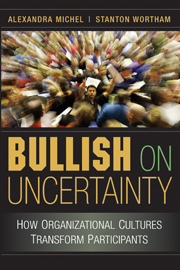Book contents
- Frontmatter
- Contents
- Foreword by Kenneth J. Gergen
- Acknowledgments
- 1 Bullish on Uncertainty
- PART 1 WORK PRACTICES
- PART 2 PSYCHOLOGICAL TRANSFORMATION
- 4 Recruiting
- 5 Individual-Centered Transformation
- 6 Organization-Centered Transformation
- 7 An Alternative Approach to Organizational and Psychological Transformation
- References
- Index
6 - Organization-Centered Transformation
Published online by Cambridge University Press: 10 January 2011
- Frontmatter
- Contents
- Foreword by Kenneth J. Gergen
- Acknowledgments
- 1 Bullish on Uncertainty
- PART 1 WORK PRACTICES
- PART 2 PSYCHOLOGICAL TRANSFORMATION
- 4 Recruiting
- 5 Individual-Centered Transformation
- 6 Organization-Centered Transformation
- 7 An Alternative Approach to Organizational and Psychological Transformation
- References
- Index
Summary
As shown in Chapter 4, new Organization Bankers began with the same individual-centered psychological functioning as new Individual Bankers. This chapter describes how Organization Bank's work practices socialized new bankers into a different orientation toward themselves, others, and resources for problem solving. We refer to this approach as direct involvement. Direct involvement involves a sociocentric self-interpretation. Organization Bankers believed that their personal capacities were merely one among many potential resources that could contribute to their work. They did not focus on their own identity traits as central explanations for action. Junior Organization Bankers, as they learned this new approach, attended less and less to individual traits. Instead, they learned to think, feel, and act with respect to concrete situational cues. This chapter describes new Organization Bankers' transformations, using the same three time periods as in the last chapter: introductory training (first five weeks), official learning (months two to six), and the rest of the time we observed them (months seven to twenty-four). For each of the last two time periods, we first discuss self-interpretations and then the functioning of cognition, emotion, and motivation.
At the beginning of introductory training, new Organization Bankers had the same types of uncertainties as new Individual Bankers – they wanted to know what tasks they would do and what identities they would have in the new context. In contrast to Individual Bank's uncertainty-reduction approach, however, Organization Bank amplified the bankers' cognitive uncertainty. It withheld behavioral guidelines and identity categories.
- Type
- Chapter
- Information
- Bullish on UncertaintyHow Organizational Cultures Transform Participants, pp. 160 - 209Publisher: Cambridge University PressPrint publication year: 2008



